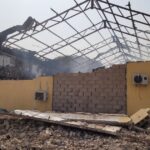
He noted that the development portends danger for the country.
Sonibare, who disclosed this while delivering his inaugural lecture, “Air Pollution Control Lacuna in Nigeria: The Intervention of a Chemical Engineer,” a copy of which was obtained in Osogbo on Monday, said the unavailability of the data has made it impossible to make a categorical statement on the air quality status in the country.
The university lecturer further stated that for Nigeria to continue to participate in the global quest for sustainable development goals, there was a need for the country to commission national air quality campaigns.
According to him, commissioning national air quality campaigns would help in generating reliable data for the country’s air quality status description regularly.
He said, “I have no sufficient data to make pronouncement about the country’s present air quality status. Thus one is not surprised that since we have no data to conveniently classify Nigeria’s air quality status, there is dearth of data also in the literature, both in quality and quantity, that can be used to do the same without misleading the public.
“This does not only portend great danger for the country but unsettles the minds of experts about the quality of air that will be handed over to the coming generation by this generation.
“For Nigeria to continue her participation in the global quest for sustainable development as in Sustainable Development Goals (SDGs), there is the need to commission national air quality campaigns through which reliable data can be generated for the country’s air quality status description at all times.”
Speaking further, Sonibare said air pollution could be from natural or anthropogenic activities either indoors or outdoors, thus causing environmental and health damages.
He, however, suggested to the federal government to establish a body that would integrate and regulate the activities of the present ‘illegal refineries of the Niger Delta,’ harmonise the country’s ambient air quality and source emissions standards, and also embark on a national air quality monitoring programme to create a National Data Bank for air quality management.





